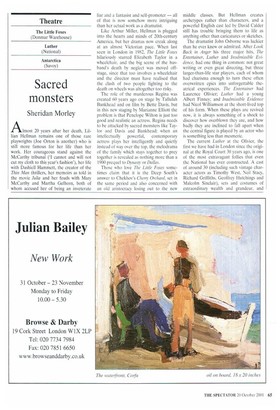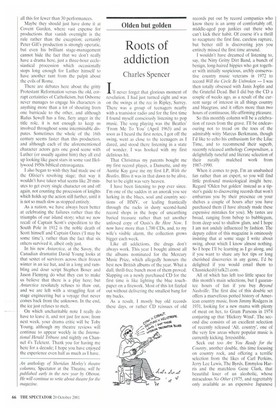Sacred monsters
Sheridan Morley
Almost 20 years after her death, Lillian Hellman remains one of those rare playwrights (Joe Orton is another) who is still more famous for her life than her work. Her courageous stand against the McCarthy tribunal (I cannot and will not Cut my cloth to this year's fashion'), her life with Dashiell Hammett, the creator of the Thin Man thrillers, her memoirs as told in the movie Julia and her feuds with Mary McCarthy and Martha Gelhorn, both of whom accused her of being an inveterate
liar and a fantasist and self-promoter — all of that is now somehow more intriguing than her actual work as a dramatist.
Like Arthur Miller, Hellman is plugged into the hearts and minds of 20th-century America, but her dramas now creak along at an almost Victorian pace. When last seen in London in 1982, The Little Foxes hilariously starred Elizabeth Taylor in a wheelchair, and the big scene of the husband's death by neglect was moved offstage, since that too involves a wheelchair and the director must have realised that the clash of two people fighting to the death on wheels was altogether too risky.
The role of the murderous Regina was created 60 years ago on stage by Tallulah Bankhead and on film by Bette Davis, but in this new staging by Marianne Elliott the problem is that Penelope Wilton is just too good and realistic an actress. Regina needs to be attacked by sacred monsters like Taylor and Davis and Bankhead; when an intellectually powerful, contemporary actress plays her intelligently and quietly instead of way over the top, the melodrama of the family which stays together to prey together is revealed as nothing more than a 1900 prequel to Dynasty or Dallas.
Those who love The Little Foxes sometimes claim that it is the Deep South's answer to Chekhov's Cheny Orchard, set in the same period and also concerned with an old aristocracy losing out to the new
middle classes. But Hellman creates archetypes rather than characters, and a powerful English cast led by David Calder still has trouble bringing them to life as anything other than caricatures or sketches.
The dramatist John Osborne was luckier than he ever knew or admitted. After Look Back in Anger his three major hits, The Entertainer, Luther and Inadmissible Evidence, had one thing in common: not great writing or even great directing, but three larger-than-life star players, each of whom had charisma enough to turn these often overwritten epics into unforgettable theatrical experiences. The Entertainer had Laurence Olivier; Luther had a young Albert Finney; and Inadmissible Evidence had Nicol Williamson at the short-lived top of his form. When these plays are revived now, it is always something of a shock to discover how overblown they are, and how badly they are inclined to fall apart when the central figure is played by an actor who is something less than mesmeric.
The current Luther at the Olivier, the first we have had in London since the original at the Royal Court 30 years ago, is one of the most extravagant follies that even the National has ever constructed. A cast of around 30 (including such vintage character actors as Timothy West, Neil Stacy, Richard Griffiths, Geoffrey Hutchings and Malcolm Sinclair), sets and costumes of extraordinary wealth and grandeur, and all this for fewer than 30 performances.
Maybe they should just have done it at Covent Garden, where vast expense for productions that vanish overnight is the rule rather than the exception; certainly Peter Gill's production is strongly operatic, but even his brilliant stage-management cannot hide the fact that we don't really have a drama here, just a three-hour ecclesiastical procession which occasionally stops long enough for Luther himself to have another rant from the pulpit about the evils of Rome.
There are debates here about the gritty Protestant Reformation versus the old, corrupt certainties of Catholicism, but Osborne never manages to engage his characters in anything more than a lot of shouting from one barricade to the other, and although Rufus Sewell has a fine, fiery anger in the title role, it is not enough to keep us involved throughout some interminable disputes. Sometimes the whole of the 16th century seems faster than this production, and although each of the aforementioned character actors gets one good scene with Luther (or usually against him) they all end up looking like guest stars in some vast Hollywood 1950s biblical extravaganza.
I also began to wish they had made use of the Olivier's revolving stage; that way it wouldn't have taken what seems like 20 minutes to get every single character on and off again, not counting the procession of knights which holds up the action still further, until it is not so much slow as stopped entirely.
As a nation, we have always been better at celebrating the failures rather than the triumphs of our island story; what we now recall of Captain Scott's expedition to the South Pole in 1912 is the noble death of Scott himself and Captain Oates CI may be some time'), rather than the fact that six others survived it, albeit only just.
In his new Antarctica, at the Savoy, the Canadian dramatist David Young looks at that sextet of survivors across their frozen winter in an ice hut, and in a long and rambling and dour script Stephen Boxer and Jason Flemyng do what they can to make us believe that there is a play here; but Antarctica resolutely refuses to thaw out, and we are left with a straggling feat of stage engineering but a voyage that never comes back from the unknown. In the end, the ice just refuses to melt.
On which uncharitable note I really do have to leave it, and not just for now: from next week, your drama critic will be Toby Young, although my theatre reviews will continue to appear weekly in the International Herald Tribune and nightly on Channel 4's Teletext. Thank you for having me here for a decade; I hope you have enjoyed the experience even half as much as I have.
An anthology of Sheridan Morley's theatre columns. Spectator at the Theatre, will be published early in the new year by Oberon. He will continue to write about theatre for the magazine.



























































































 Previous page
Previous page